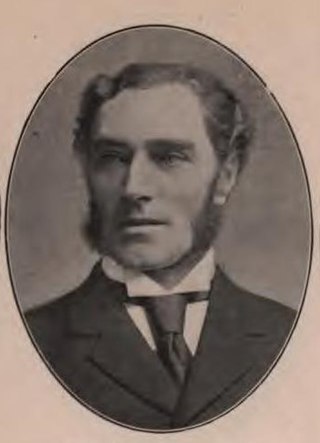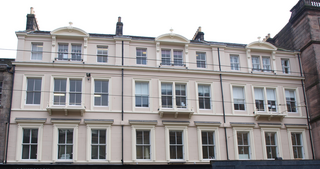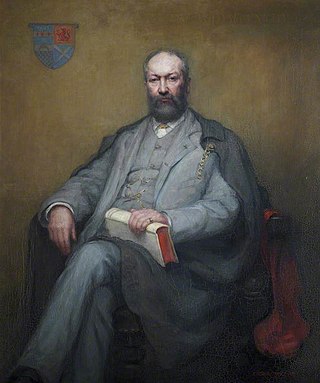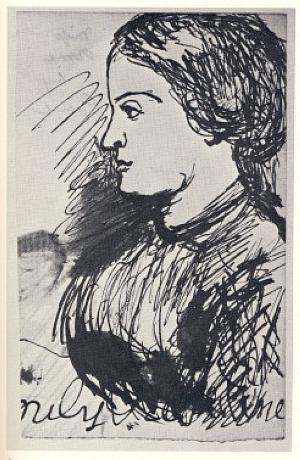
Sir Charles John Pearson was a Scottish politician and judge who rose to be a Senator of the College of Justice.
The history of the University of St Andrews began with its foundation in 1410 when a charter of incorporation was bestowed upon the Augustinian priory of St Andrews Cathedral. The University grew in size quite rapidly; St Salvator's College was established in 1450, St Leonard's College in 1511 and St Mary's College in 1537. Some of the college buildings in use today date from this period as does St Salvator's Chapel. At this time much of the teaching was of a religious nature and was conducted by clerics associated with the cathedral.

The Edinburgh Association for the University Education of Women (EAUEW), originally known as the Edinburgh Ladies' Educational Association (ELEA), campaigned for higher education for women from 1867 until 1892 when Scottish universities started to admit female students. For nearly a quarter of a century it arranged its own classes for women with lecturers from Edinburgh University, and it was connected with a wider campaign across Europe to open universities to women students.
Mary Crudelius was a British campaigner for women's education who lived in Leith, Edinburgh in the 1860s and 1870s, and was a supporter of women's suffrage. She was a founder of the Edinburgh Association for the University Education of Women.

William Angus Knight was a Scottish Free Church minister and author and Professor of Moral Philosophy at St Andrews University. He created the Lady Literate in Arts qualification.

St Leonards School is a private boarding and day school for pupils aged 4–19 in St Andrews, Fife, Scotland. Founded in 1877 as St Andrews School for Girls Company, it adopted the St Leonards name upon moving to its current premises, the site formerly occupied by the University of St Andrews’ St Leonard's College, in 1883.

Dame Louisa Innes Lumsden was a Scottish pioneer of female education. Lumsden was one of the first five students Hitchen College, later Girton College, Cambridge in 1869 and one of the first three women to pass the Tripos exam in 1873. She returned as the first female resident and tutor to Girton in 1873. From 1877-82, Lumsden became the first Headmistress of St Leonards School, Fife, and first warden of University Hall, University of St Andrews which opened in 1896. She is credited with introducing lacrosse to St Leonards.

Marion Gilchrist was the first female graduate of the University of Glasgow, one of the first two women to qualify in medicine from a Scottish university; and a leading activist in the Women's suffrage Movement in Scotland. In recognition of her achievements she has been honoured in a number of ways.
Pat Douthwaite was a Scottish artist. She has been notably compared to Amedeo Modigliani and Chaïm Soutine, the peintres maudits of early twentieth-century Paris.
Margaret Hardinge Irwin CBE was a suffragist, and Scottish labour activist who held important posts in the trade union movement.
Madeline Margaret Daniell was a Scottish educationalist and campaigner for women's rights to higher education.
Elizabeth Mary Jane Fish was a schoolteacher and the first elected woman president of the Educational Institute of Scotland, the oldest teachers' trade union in the world.
Mary Cosgrave was an Irish social worker and local politician.

Emily Rosaline Orme (1835–1915) was a leader of the Edinburgh National Society for Women's Suffrage. She was a noted campaigner for women's suffrage in Scotland.

Alice Woods or Alice Augusta Woods was a British educationist and college head. She was an advocate for co-education.

Cecil Chetwynd Kerr, Marchioness of Lothian was a British noblewoman and philanthropist who founded the Anglican Saint John's Church in Jedburgh and the Roman Catholic Saint David's Church in Dalkeith. A follower of the Oxford Movement, she eventually converted from Anglicanism to Roman Catholicism after she was widowed.
Mary Walker was a Scottish teacher who was the founding head of the first Scottish teacher training college and the head of the first Scottish day school, St. George's High School for Girls to teach girls to pass university entrance exams.

Josephine "Phiny" Katherine Stewart was a British schoolmistress, tennis and hockey player, golfer and President of the Scottish Women's Lacrosse Association. She was devoted to sport and St Leonards School in St Andrews in Scotland.
Isabel Cleghorn LLA was a British educationist and suffragist. She was the headteacher at Heeley which is now part of Sheffield and she was the first woman President of the National Union of Teachers in 1911.
Sarah Bannister LLA born Sarah Jane Stourton was a British educationist, school inspector and district councillor. She and her husband were involved with the pupil-teacher scheme in London. She served for twenty years as a district councillor in Hendon. She was creditted with creating Hendon Free Library.











